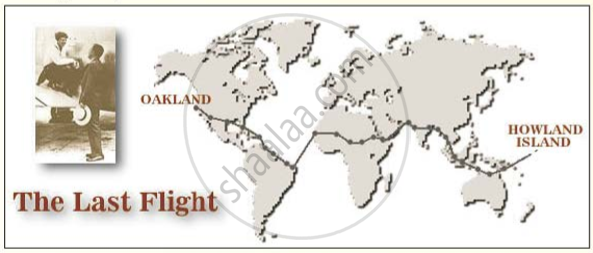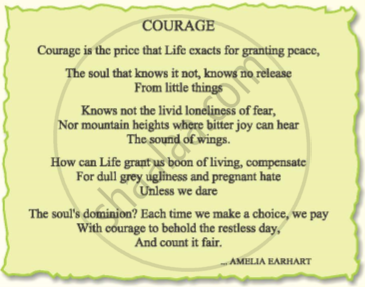Advertisements
Advertisements
Question
Why do you think we should be kind towards animals?
Solution
Animals are also living beings like us. They can’t speak like us but still can feel the love and emotions. Some animals like dog and horse are very faithful to human beings. We should be kind towards them.
It is good to offer our leftover food to the street dogs because they guard our homes. Chapattis should be offered to homeless cows. In winter we should keep bowls of water for the birds. Injured animals like pigeons, cats and dogs should be taken to veterinary doctors by us.
APPEARS IN
RELATED QUESTIONS
Answer these question in a few words or a couple of sentence.
Where was Margie’s school? Did she have any classmates?
Explain what the reason for the following is .
Einstein wanting to study in Switzerland rather than in Munich.
What reasons does he give to Sergei for his telling lies?
Discuss with your partner the similarities and differences between your dream
houses.
The world's most famous female aviator, Amelia Earhart, disappeared in 1937, as she attempted to become the first woman to fly around the world with her navigator, Fred Noonan. She was last heard when she was around 100 miles from the tiny Pacific Howland Island on July 2, 1937.
Read the story of her 'Final Flight'.
On June 1, 1937 Amelia and her navigator Fred Noonan departed from Miami, Florida; bound for California. Their first destination was San Juan, Puerto Rico; from there, skirting the northeast edge of South America; and then on to Africa and the Red Sea.
The flight to Karachi was another first. No one had previously flown non-stop from the Red Sea to India before. From Karachi, the Electra flew to Calcutta on June 17 from there on, to Rangoon, Bangkok, Singapore and Bandoeng.
The monsoon prevented departure from Bandoeng for several days. Repairs were made on some of the 'long distance' instruments which had given trouble previously. During this time, Amelia became ill, and suffered from dysentery that lasted several days.
It was June 27 before Amelia and Noonan were able to leave Bandoeng for Port Darwin, Australia. At Darwin, the direction finder was repaired, and the parachutes were packed and shipped home as they would be of no value over the Pacific .
Amelia reached Lae in New Guinea on June 29. At this point they had flown 22,000 miles and there were 7,000 more to go over the Pacific. Amelia cabled her last commissioned article to the Herald Tribune. Photos show her looking very tired and ill during her time at Lac.
The U.S. Coast Guard cutter, Itasca had been standing off Howland Island for some day to act as a radio contact for Amelia Radio communications in the area were very poor as Itasca was overwhelmed with commercial radio traffic that the flight had generated .

Amelie left Lae at preciaely 00:00 hours Greenwich Mean Time on July 2 . It is believed that the Electra was loaded with 1,000 gallons of fuel , allowing for 20-21 hours of flying .
At 07:20 hours GMT Amelia provided a position report placing the Electra on course as some 20 miles southwest of the Nukumanu Islands . The last weather report Amelia was known to have received was before take-off . The head wind speed had increased by 10-12 mph, but it is not known if she ever received the report.
At 08:00 GMT Amelia made her last radio contact with Lae . she reported being on course for Howland Island at 12,000 feet . There is no real evidence as to the precise track of the aircraft after Nukumanu . No one saw or heard the plane fly over .
Several short transmissions were received by the Itasca with varying signal strengths but they were unable to get a fix on her location because they were too brief. At 19:30 GMT the following transmission was received from the Electra at maximum strength.
"KHAQQ calling Itasca. We must be on you but cannot see you ... gas is running low ... "
At 20: 14 GMT, the Itasca received the last voice transmission from Amelia giving positioning data. The Itasca continued to transmit on all frequencies until 21:30 hours GMT. They determined that Amelia must have died at sea and began to implement search procedures.
It has been determined that the plane went down some 35-100 miles off the coast of Howland Island. A life raft was stowed on board but no trace was ever found of the raft. Some experts felt that the empty fuel tanks could keep the plane afloat for a period of time.
President Roosevelt authorized a search party of 9 naval ships and 66 aircrafts at an estimated cost of over $4 million. On July 18, the search was abandoned by ships in the Howland area. George continued to seek help in the search, but by October he too abandoned all hope of finding them alive.
Amelia had been sending letters to George at stopovers all along her route quite regularly. These were published in the book 'Last Flight'. The book has a note from her to George ....
"Please know I am quite aware of the hazards ... I want to do it because I want to do it. Women must try to do things as men have tried. If they fail, their failure must be, but a challenge to others. "

Amelia created a number of aviation records :
o The first woman to fly across the Atlantic in 1928
o The second person to fly solo across the Atlantic in 1932
o The first person to fly solo from Hawaii to California in 1935 Guided by her publicist and husband, George Putnam, she made headlines in an era when aviation had gripped the public's imagination.
Six humans trapped by happenstance
In black and bitter cold.
Each one possessed a stick of wood,
Or so the story's told.
Their dying fire in need of logs;
The first man held his back.
For on the faces around the fire,
He noticed one was black.
Read the lines given above and answer the question that follow:
What is suggested by the use of the word trapped?
Bangle sellers are we who bear
Our shining loads to the temple fair...
Who will buy these delicate, bright
Rainbow-tinted circles of light?
Lustrous tokens of radiant lives,
For happy daughters and happy wives.
Read the lines given above and answer the question that follow.
Explain the line’ lustrous tokens of radiant lives’.
Such wondrous, fine, fantastic tales
Of dragons, gypsies, queens, and whales
And treasure isles, and distant shores
Where smugglers rowed with muffled oars,
And pirates wearing purple pants,
And sailing ships and elephants,
And cannibals crouching 'round the pot,
Stirring away at something hot.
(It smells so good , what can it be?
Good gracious, it's Penelope.)
The younger ones had Beatrix Potter
With Mr.Tod,the dirty rotter,
And Squirrel Nutkin,Pigling Bland,
And Mrs.Tiggy-Winkle and-
Just How The Camel Got His Hump,
And How the Monkey Lost His Rump,
And Mr. Toad, and bless my soul,
There's Mr.Rat and Mr. Mole-
Oh, books, what books they used to know,
Those children living long ago!
Read the lines given above and answer the question given below.
To which author does Dahl pay a tribute?
It matters little where we pass the remnant of our days. They will not be many. The Indian’s night promises to be dark. Not a single star of hope hovers above his horizon. Sad-voiced winds moan in the distance. Grim fate seems to be on the Red Man’s trail, and wherever he will hear the approaching footsteps of his fell destroyer and prepare stolidly to meet his doom, as does the wounded doe that hears the approaching footsteps of the hunter.
A few more moons, a few more winters, and not one of the descendants of the mighty hosts that once moved over this broad land or lived in happy homes, protected by the Great Spirit, will remain to mourn over the graves of a people once more powerful and hopeful than yours. But why should I mourn at the untimely fate of my people? Tribe follows tribe, and nation follows nation, like the waves of the sea. It is the order of nature, and regret is useless. Your time of decay may be distant, but it will surely come, for even the White Man whose God walked and talked with him as friend to friend, cannot be exempt from the common destiny. We may be brothers after all. We will see.
Read the extract given below and answer the question that follow.
Why does Seattle say that they maybe brothers after all?
An old man with steel rimmed spectacles and very dusty clothes sat by the side of the road. There was a pontoon bridge across the river and carts, trucks, and men, women and children were crossing it. The mule-drawn carts staggered up the steep bank from the bridge with soldiers helping push against the spokes of the wheels. The trucks ground up and away heading out of it all and the peasants plodded along in the ankle deep dust. But the old man sat there without moving. He was too tired to go any farther.
Read the extract given below and answer the question that follow.
What does the reference to the old man in the beginning and the end of the passage indicate?
Mrs. Thompson did not reply, but presently turned towards the little chamber where her husband had deposited Maggie; and, pushing open the door, went quietly in. Joe did not follow; he saw that, her state had changed, and felt that it would be best to leave her alone with the child. So he went to his shop, which stood near the house, and worked until dusky evening released him from labor. A light shining through the little chamber windows was the first object that attracted Joe’s attention on turning towards the house: it was a good omen. The path led him by this windows and, when opposite, he could not help pausing to look in. It was now dark enough outside to screen him from observation. Maggie lay, a little raised on the pillow with the lamp shining full upon her face. Mrs. Thompson was sitting by the bed, talking to the child; but her back was towards the window, so that her countenance was not seen. From Maggie’s face, therefore, Joe must read the character of their intercourse. He saw that her eyes were intently fixed upon his wife; that now and then a few words came, as if in answers from her lips; that her expression was sad and tender; but he saw nothing of bitterness or pain. A deep-drawn breath was followed by one of relief, as a weight lifted itself from his heart.
Read the extract given below and answer the question that follow.
Why did Joe not follow Mr s Thompson? What had changed her?
Why did the sun ask the rays to stay up in the sky?
How are trees useful for birds?
Choose the synonym of the word ‘whirling.’
Talk to your partner and say whether the following statement is true or false.
Most snakes are harmless.
What does the poem Whatif talk about? Give a few examples of some of the child’s worries or cynical fears.
Multiple Choice Question:
What are these doubts and worries called?
Discuss the posture of the squirrel as discussed in line 3 of the poem.
Can there be a good reason behind speaking when everybody else is silent?
Read the following sets of words loudly and clearly.
cot – coat
cost – coast
tossed – toast
got – goat
rot – rote
blot – bloat
knot – note
